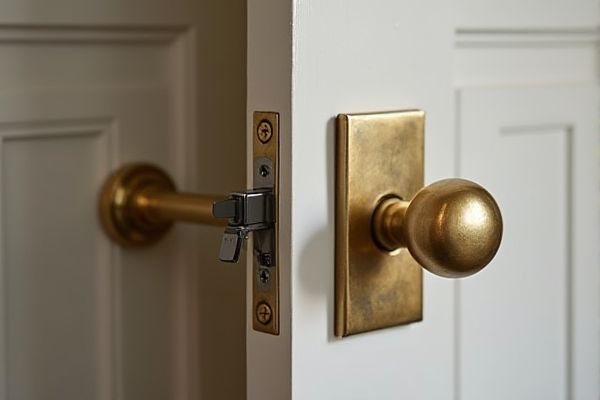
Brass hardware offers a warm, golden tone that enhances traditional and vintage designs, while nickel hardware provides a sleek, modern, and durable finish with excellent resistance to tarnishing. Discover more about how your choice between brass and nickel hardware can transform the look and functionality of your space by reading the rest of this article.
Table of Comparison
| Feature | Brass Hardware | Nickel Hardware |
|---|---|---|
| Material Composition | Alloy of copper and zinc | Alloy of nickel, often with copper or zinc |
| Appearance | Warm, yellow-gold tone | Cool, silvery-gray finish |
| Durability | Highly durable, corrosion resistant | Very durable, resistant to tarnish and corrosion |
| Maintenance | Requires polishing to maintain shine | Low maintenance, resists fingerprints and tarnish |
| Cost | Generally more affordable | Typically higher price point |
| Common Uses | Classic, vintage-style fixtures and decor | Modern, sleek hardware for appliances and fittings |
| Resistance to Wear | Moderate; patinas over time | High; maintains finish longer |
Introduction to Brass and Nickel Hardware
Brass hardware, composed primarily of copper and zinc, offers a warm, gold-toned finish known for its durability and resistance to corrosion, making it ideal for traditional and vintage-style decor. Nickel hardware, made from a blend of nickel, copper, and iron, provides a sleek silver appearance with a modern, polished or matte finish that complements contemporary designs. Your choice between brass and nickel hardware impacts the overall aesthetic and longevity of fixtures in furniture and architectural elements.
Key Differences Between Brass and Nickel Hardware
Brass hardware features a warm, golden tone with natural antimicrobial properties, making it ideal for decorative accents that resist tarnishing. Nickel hardware offers a cooler, silver-gray finish known for its durability and corrosion resistance, commonly used in modern and industrial designs. Understanding these key differences helps you choose the right hardware to complement your style and functional needs.
Aesthetic Appeal: Brass vs Nickel
Brass hardware offers a warm, vintage aesthetic with its rich golden tones that complement traditional and rustic decor styles, creating a timeless and inviting atmosphere. Nickel hardware provides a sleek, modern look with its cool, silvery finish that blends seamlessly with contemporary and industrial designs. Choosing between brass and nickel hinges on the desired interior style, where brass enhances warmth and character while nickel emphasizes clean lines and understated elegance.
Durability and Longevity Comparison
Brass hardware offers excellent durability due to its corrosion resistance and ability to withstand wear in high-traffic areas, often lasting several decades without significant tarnishing. Nickel hardware, especially when plated, provides strong resistance to rust and scratches but may show signs of wear or peeling over time in harsh conditions. Both materials excel in longevity, with brass typically outperforming nickel in environments prone to moisture or frequent use because of its naturally robust composition.
Maintenance and Cleaning Requirements
Brass hardware requires regular polishing to prevent tarnishing and maintain its natural golden sheen, often needing a mild soap solution and soft cloth to avoid scratching. Nickel hardware is more resistant to corrosion and fingerprints, allowing for easier maintenance with simple wiping using a damp cloth and mild detergent. Both metals benefit from timely cleaning to preserve appearance, but nickel's durability typically results in less frequent and less intensive care compared to brass.
Cost Factors: Brass vs Nickel Hardware
Brass hardware typically costs more than nickel hardware due to its material composition and manufacturing process, often commanding a premium price in luxury or vintage-style applications. Nickel hardware, especially in satin or brushed finishes, tends to be more affordable and widely available, making it a popular choice for budget-conscious projects without sacrificing durability. Price variations also depend on factors such as plating quality, brand reputation, and the complexity of design in both brass and nickel hardware options.
Best Applications for Brass Hardware
Brass hardware is best suited for vintage and traditional design styles due to its warm, golden tones and natural resistance to corrosion. It performs exceptionally well in coastal or humid environments because of its durability and ability to develop a unique patina over time. Your choice of brass hardware enhances cabinetry, door knobs, and lighting fixtures where classic elegance and long-lasting quality are desired.
Ideal Uses for Nickel Hardware
Nickel hardware is ideal for environments that require durability and resistance to corrosion, making it perfect for kitchen and bathroom fixtures exposed to moisture. Its sleek, modern appearance complements contemporary design styles and provides a subtle shine that enhances cabinetry and furniture aesthetics. You can rely on nickel hardware for both functional longevity and a sophisticated finish in high-traffic or humid areas.
Environmental Impact and Sustainability
Brass hardware is often considered more sustainable due to its high recyclability and durability, which reduces waste over time. Nickel hardware, while corrosion-resistant, typically involves more energy-intensive mining and refining processes that contribute to a larger environmental footprint. Choosing brass helps minimize ecological impact by supporting metals with lower carbon emissions and longer lifecycle performance.
Choosing the Right Hardware for Your Space
Brass hardware offers a warm, classic look that pairs well with traditional and vintage design styles, enhancing spaces with golden, rich tones. Nickel hardware provides a sleek, modern appearance with its cool, silvery finish, ideal for contemporary and minimalist interiors. Selecting between brass and nickel depends on the desired aesthetic, durability concerns, and the complementary color palette of your room.
 homyna.com
homyna.com